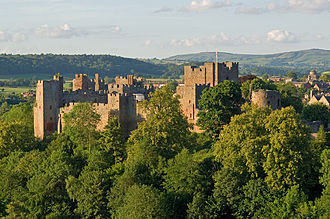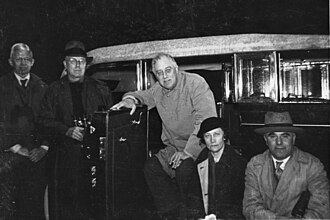Discover Your Roots
SIGN UPDiscover Your Roots
SIGN UPLudlow is a male name of English origin that means "From The Loud River Hill". It is derived from the Old English "hlud-hlǣw", which refers to a place on a hill by the loud waters, describing a location near the confluence of the rivers Corve and Teme in Shropshire, England. The town of Ludlow holds historical significance, being a market town and civil parish with a medieval walled town, Ludlow Castle, and the parish church, St Laurence's. The name has been associated with national importance in medieval times, serving as the seat of the Council of Wales and the Marches. Ludlow has nearly 500 listed buildings, including medieval and Tudor-style half-timbered buildings, and has been described as "probably the loveliest town in England" by Sir John Betjeman. The name Ludlow reflects a rich and historically significant heritage tied to the English landscape and culture.

Ludlow Castle, located in Shropshire, England, is a medieval fortress with a rich and storied history. Founded by Walter de Lacy after the Norman Conquest, it was one of the first stone castles in England. Throughout the 12th and 13th centuries, it changed hands several times, with various owners reinforcing and expanding its structures. Notably, it played a significant role in the Wars of the Roses and the English Civil War. Over the centuries, it served as the seat of the Council of Wales and the Marches, a center of cultural events, and a Royalist stronghold during the Civil War. Today, the castle is a popular tourist attraction, owned by the Earl of Powis and operated as a historical site. With its blend of architectural styles and extensive grounds, the castle offers visitors a glimpse into its fascinating and diverse past. Whether exploring the Great Tower, Solar block, Great Hall, or the rare circular chapel, Ludlow Castle stands as a testament to centuries of history and cultural significance.

Ludlow Porch, born Bobby Crawford Hanson, was an American radio humorist known for his popularity in the Southern United States. He was a prolific author, penning numerous humor books such as "Fat White Guys Cookbook" and "Who Cares about Apathy." Ludlow's career took off after a 1972 article in Sports Illustrated caught the attention of WSB radio in Atlanta, where he became a regular talk-show host for over 30 years, charming audiences with his down-home sense of humor and friendliness. His famous sign-off, "Whatever else you do today, you find somebody to be nice to!" became synonymous with his shows. Furthermore, Ludlow was also recognized for his literary contributions, receiving accolades such as his induction into the Georgia Radio Hall of Fame in 2007. His legacy lives on through his books and the laughter he brought to countless listeners. Ludlow Porch passed away on February 11, 2011, leaving behind a rich and enduring comedic legacy.

Ludlow Griscom (June 17, 1890 – May 28, 1959) was an influential American ornithologist recognized as a trailblazer in field ornithology. He gained widespread acclaim for his emphasis on identifying free-flying birds by field marks, a method that was adopted by both professionals and amateurs. Known as the "Dean of the Birdwatchers," Griscom's passion for birds developed early in his life, leading him to join the Linnaean Society of New York in 1907. After receiving his A.B. degree from Columbia University, he pursued graduate studies in ornithology at Cornell University under the guidance of Arthur A. Allen and Louis Agassiz Fuertes. His career included significant roles at the American Museum of Natural History and Harvard University's Museum of Comparative Zoology, where he made notable scientific contributions and served as a dedicated administrator. Additionally, Griscom demonstrated his commitment to his country by serving as a 2nd Lieutenant in the Psychological Subsection of Military Intelligence during World War I, playing a role in early U.S. military psychological operations. Throughout his life, he remained actively involved in professional organizations, including the American Ornithologists' Union, contributing to the study of live birds and the transition of the organization's focus. Ludlow Griscom's legacy endures as an influential figure in the field of ornithology, leaving a lasting impact on the study and appreciation of birds.

Ludlow is a multi-faceted town in Shropshire, England, renowned for its diverse array of businesses, educational institutions, and rich history. Notable for its literary associations, Ludlow inspired David Mason's novel about the Ludlow Massacre. The town is also home to Fisher and Ludlow, a prominent British car body manufacturing company, and Ludlows, an erstwhile English bus company. Educational establishments such as Ludlow College, Fairfield Ludlowe High School, and Ludlow High School contribute to the town's academic prominence.The name "Ludlow" is associated with various individuals and titles, including Earl Ludlow and Baron Ludlow in the Peerage of Ireland and the United Kingdom. Additionally, Ludlow boasts a rich array of places and attractions, including Ludlow Racecourse, Ludlow Golf Club, and Ludlow Castle, a historic landmark in Shropshire. Sports enthusiasts can also enjoy Ludlow Lusitano, a former American soccer club, and Ludlow Town F.C., a prominent football club. The town's transportation system is well-served by Ludlow railway station and Ludlow (Metro-North station) in Yonkers, New York.Ludlow's rich tapestry of history and culture is further underscored by its association with the Ludlow Massacre, a tragic event during the Colorado Coalfield War in 1914. Additionally, Ludlow is linked to various notable landmarks, such as Ludlow Monument,

Ludlow Murcott Moody CBE (1 November 1892 – 19 November 1981) was a Jamaican doctor and public servant known for his contributions to medicine and his dedicated public service. Born in Kingston, Jamaica, Ludlow Moody pursued his medical studies at the prestigious King's College London Medical School, where he excelled, winning several notable prizes and scholarships. After completing his education, he returned to Jamaica and worked as a government bacteriologist before establishing a successful private medical practice in Kingston. Moody's commitment to public service extended beyond his medical career, as he served as a justice of the peace, a member of the Jamaica Public Services Commission, and held the esteemed position of custos of Kingston. He also played a significant role in education as an Old Boy and former chairman of the Wolmer's Schools. Moody's outstanding contributions were recognized with numerous honors, including an honorary doctorate in laws from the University of the West Indies and a CBE for his exemplary public service. His legacy lives on through his impactful work and esteemed reputation in the medical and public service communities.
All images displayed on this page are sourced from Wikipedia or Wikimedia Commons.We use these images under their respective Creative Commons or public domain licenses. Wherever applicable, author attributions and license information are provided. If you believe an image is used incorrectly or outside its license terms, please contact us so that we can review and correct the issue.